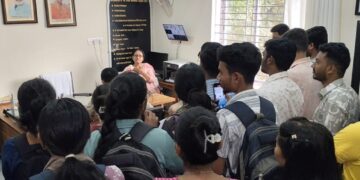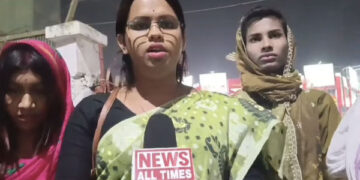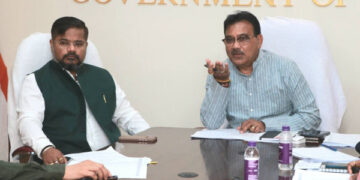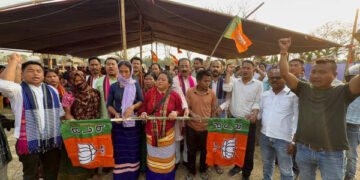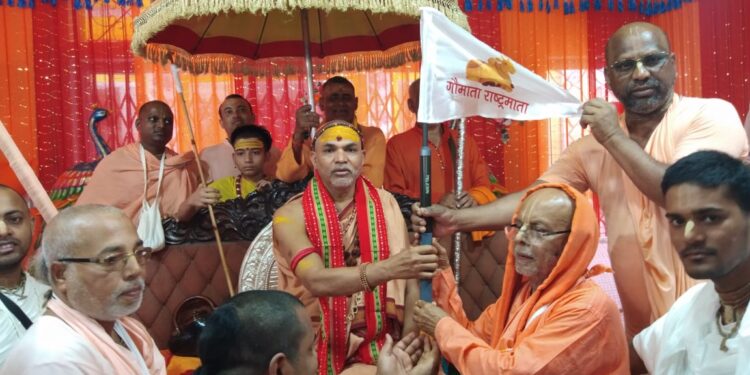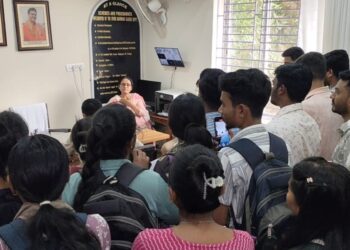Agartala, September 28: Amid growing protests against his stance on cow protection in various northeastern states, Shankaracharya Swamishrih Avimukteshwaranandah Swarawati-1008, a revered Hindu spiritual leader, addressed the controversial issue of beef consumption during his visit to Agartala on Saturday.
The Shankaracharya, currently on a national tour as part of his “Gau Dhwaj Sthapana Bharat Yatra,” aimed at raising awareness on cow reverence, stressed that awareness—not force—was the key to addressing the consumption of beef in the region.
Shankaracharya Avimukteshwaranandah stated that while beef remains a part of the diet in certain parts of the northeast, he believes in educating the public on the cultural and spiritual significance of cows, which have been worshipped in India for thousands of years.
“We don’t support pressuring anyone to stop eating beef. Instead, we believe in raising awareness about the importance of cows,” he remarked during a press briefing at Jagannath Temple in Agartala.
The spiritual leader’s “Gau Dhwaj Sthapana Bharat Yatra” seeks to create public awareness and demand for the formulation of a national law that would declare cows as sacred and protect them from slaughter.
He envisions the law being established after widespread public support and understanding, rather than through immediate government action.
When asked about the protests against him in the northeastern states, Shankaracharya Avimukteshwaranandah acknowledged the opposition but viewed it as an opportunity for public discussion.
“The protests show that people are talking about these issues. This discussion is important for forming a public opinion that will eventually lead to action,” he said.
He maintained that he had not discussed the matter with either any state or the central governments, insisting that the initiative should first be grounded in public awareness before any legislative steps are taken.
On the sensitive issue of beef consumption, he drew an analogy, saying, “Some people claim that eating beef is their right. In Myanmar, the Rohingya Muslims have reportedly started eating human flesh. Now, if they continue this, will it eventually become their ‘right’? We should form our food habits by respecting the sentiments of others. We don’t want to force anyone to change but rather open a discussion and create awareness.”
Despite the protests, the Shankaracharya reiterated his goal of building a movement that would culminate in legal protection for cows, similar to how public sentiment drives legislation in democratic societies.
He noted that although the majority of India’s population is Hindu, and various governments have come to power with their support since independence, no substantial action has been taken to safeguard cows.
“The demand for a ban on cow slaughter has been there since before Independence. Yet, after 78 years of freedom and numerous governments coming and going, none have fulfilled the promises made to the Hindu majority who consider the cow sacred. Instead, the beef trade has flourished, leaving Hindus deeply disillusioned and unhappy,” he stated.
The Shankaracharya’s tour continues, as he aims to unite the voices of those who seek the preservation of indigenous cow breeds and greater respect for India’s cultural traditions surrounding cattle.
His call for awareness rather than coercion highlights a desire to foster voluntary change in attitudes toward cow slaughter, rather than imposing government mandates without grassroots support.
The spiritual leader’s remarks come at a time of heightened sensitivity around dietary practices and religious sentiments in the northeastern states, where cultural diversity includes a wide range of food habits, including beef consumption.
However, Shankaracharya Avimukteshwaranandah remains optimistic that through dialogue and awareness, the country can achieve a consensus on the issue.

